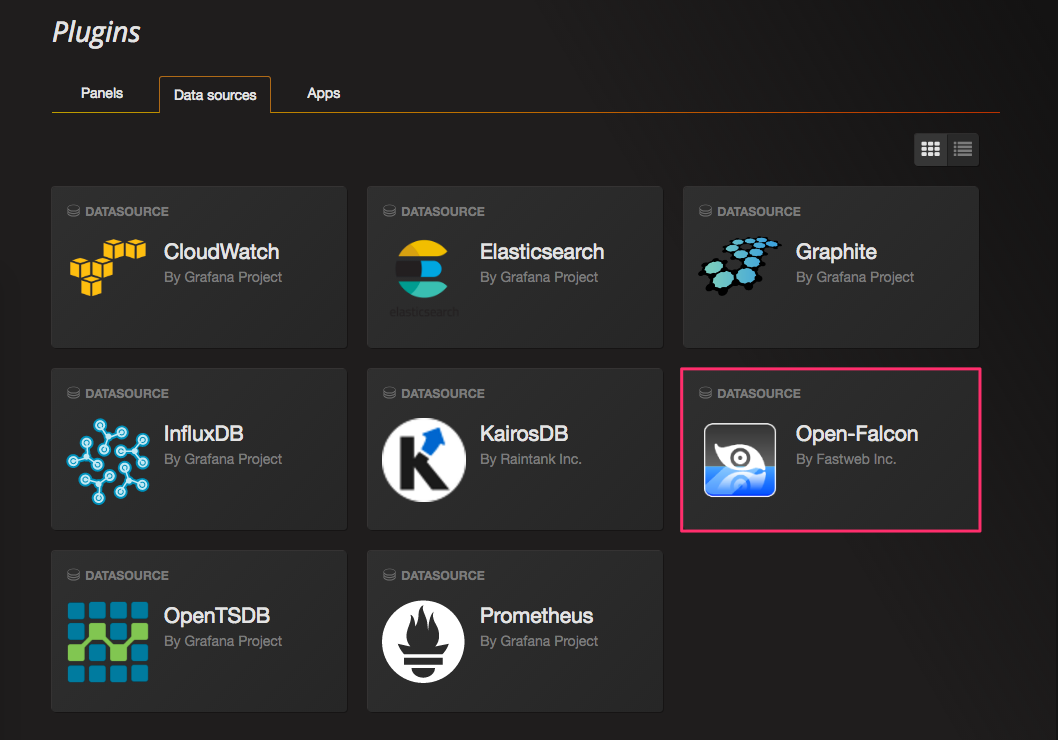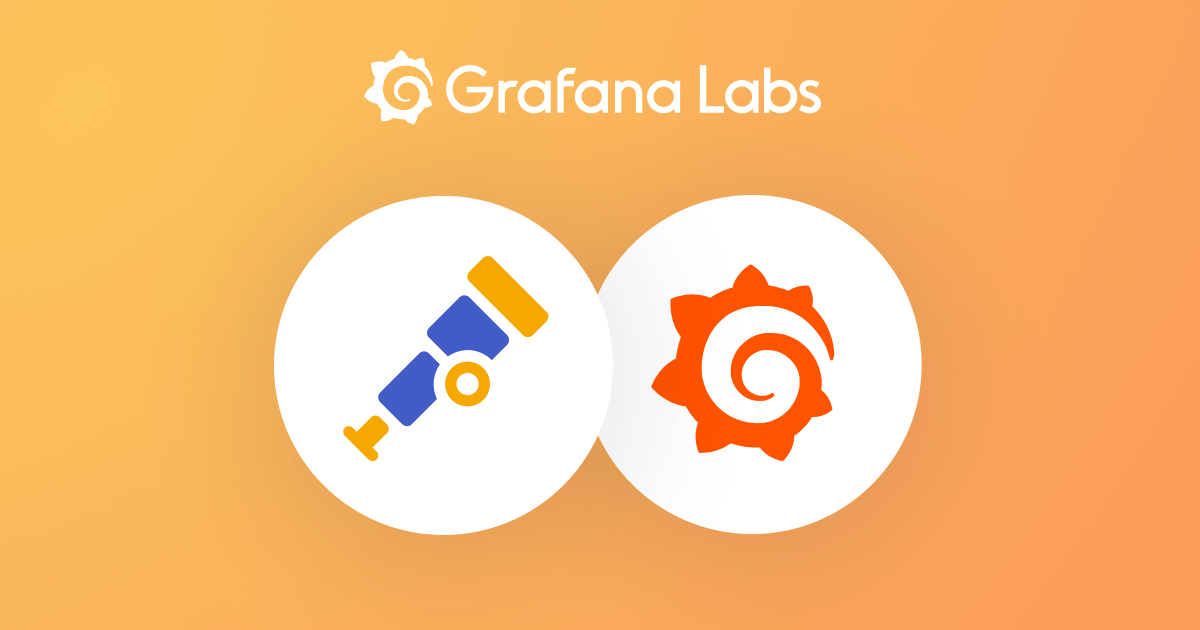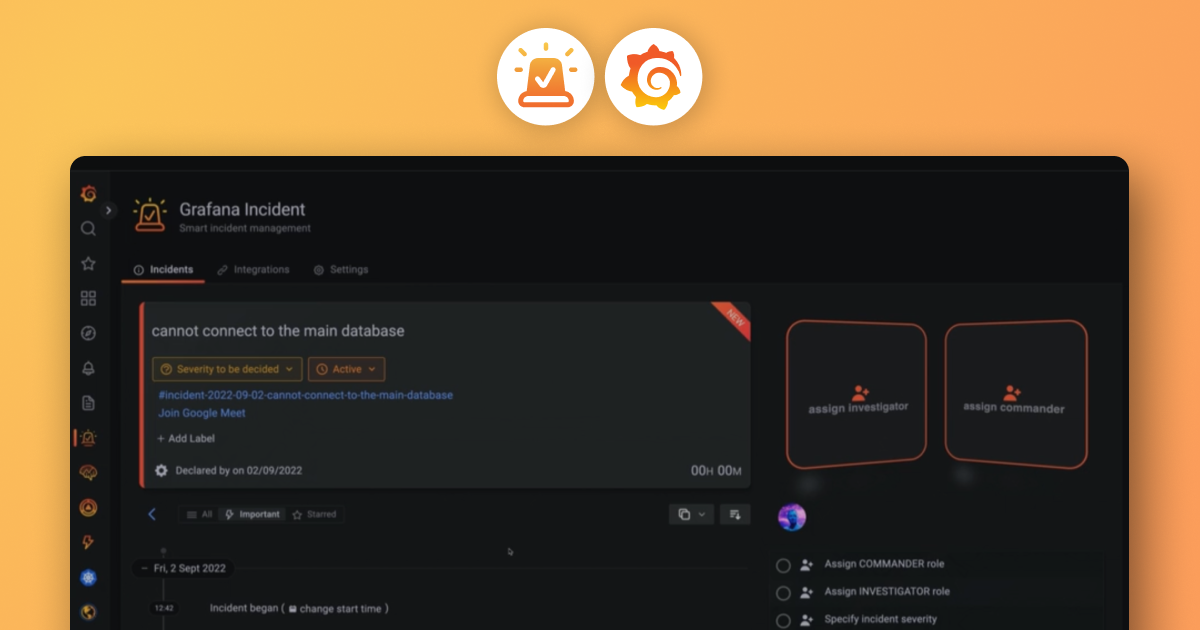Plugins 〉Open-Falcon
The Open-Falcon plugin has been deprecated and is no longer maintained.
Open-Falcon
Open-Falcon plugin for Grafana
Open-Falcon is an open-source, enterprise-level, and large-scale service monitoring system and time series database. It's initially released by Xiaomi SRE team in 2015 and heavily used in Xiaomi. Open-Falcon is now one of the most popular monitoring system in China internet companies:
- www.mi.com
- www.meituan.com
- www.Xunlei.com
- www.Baidu.com
- www.ksyun.com
- www.douban.com
- www.fastweb.com.cn
- www.ganji.com
- www.upyun.com
- www.xiaojukeji.com
- www.iqiyi.com
More Info:
- Full company list: https://github.com/XiaoMi/open-falcon/issues/4
- Release: https://github.com/open-falcon/of-release
- Documentation: http://book.open-falcon.org
Installation
Method 1: Building from Source
git clone https://github.com/grafana/grafana
git checkout v3.0-beta7
Building Backend
cd $GOPATH/src/github.com/grafana/grafana
go run build.go setup (only needed once to install godep)
godep restore (will pull down all golang lib dependencies in your current GOPATH)
go run build.go build
Building Frontend
npm install
npm install -g grunt-cli
grunt
Checkout the plugin
cd $GRAFANA_PATH/public_gen/app/plugins/datasource
git clone https://github.com/hitripod/grafana-openfalcon-datasource openfalcon
Start grafana-server
./bin/grafana-server
Method 2: Using grafana-cli
grafana-cli plugins install grafana-openfalcon-datasource
Checkout the plugin
cd /var/lib/grafana/plugins
git clone https://github.com/hitripod/grafana-openfalcon-datasource grafana-openfalcon-datasource
Update the plugin information
Add the following into $GRAFANA_PATH/conf/defaults.ini:
[plugin.openfalcon]
path = /var/lib/grafana/plugins/grafana-openfalcon-datasource
After Installation
If the installation is successful, Open-Falcon datasource would be shown as follow:

Grafana Cloud Free
- Free tier: Limited to 3 users
- Paid plans: $55 / user / month above included usage
- Access to all Enterprise Plugins
- Fully managed service (not available to self-manage)
Self-hosted Grafana Enterprise
- Access to all Enterprise plugins
- All Grafana Enterprise features
- Self-manage on your own infrastructure
Grafana Cloud Free
- Free tier: Limited to 3 users
- Paid plans: $55 / user / month above included usage
- Access to all Enterprise Plugins
- Fully managed service (not available to self-manage)
Self-hosted Grafana Enterprise
- Access to all Enterprise plugins
- All Grafana Enterprise features
- Self-manage on your own infrastructure
Grafana Cloud Free
- Free tier: Limited to 3 users
- Paid plans: $55 / user / month above included usage
- Access to all Enterprise Plugins
- Fully managed service (not available to self-manage)
Self-hosted Grafana Enterprise
- Access to all Enterprise plugins
- All Grafana Enterprise features
- Self-manage on your own infrastructure
Grafana Cloud Free
- Free tier: Limited to 3 users
- Paid plans: $55 / user / month above included usage
- Access to all Enterprise Plugins
- Fully managed service (not available to self-manage)
Self-hosted Grafana Enterprise
- Access to all Enterprise plugins
- All Grafana Enterprise features
- Self-manage on your own infrastructure
Grafana Cloud Free
- Free tier: Limited to 3 users
- Paid plans: $55 / user / month above included usage
- Access to all Enterprise Plugins
- Fully managed service (not available to self-manage)
Self-hosted Grafana Enterprise
- Access to all Enterprise plugins
- All Grafana Enterprise features
- Self-manage on your own infrastructure
Installing Open-Falcon on Grafana Cloud:
Installing plugins on a Grafana Cloud instance is a one-click install; same with updates. Cool, right?
Note that it could take up to 1 minute to see the plugin show up in your Grafana.
Installing plugins on a Grafana Cloud instance is a one-click install; same with updates. Cool, right?
Note that it could take up to 1 minute to see the plugin show up in your Grafana.
Installing plugins on a Grafana Cloud instance is a one-click install; same with updates. Cool, right?
Note that it could take up to 1 minute to see the plugin show up in your Grafana.
Installing plugins on a Grafana Cloud instance is a one-click install; same with updates. Cool, right?
Note that it could take up to 1 minute to see the plugin show up in your Grafana.
Installing plugins on a Grafana Cloud instance is a one-click install; same with updates. Cool, right?
Note that it could take up to 1 minute to see the plugin show up in your Grafana.
Installing plugins on a Grafana Cloud instance is a one-click install; same with updates. Cool, right?
Note that it could take up to 1 minute to see the plugin show up in your Grafana.
Installing plugins on a Grafana Cloud instance is a one-click install; same with updates. Cool, right?
Note that it could take up to 1 minute to see the plugin show up in your Grafana.
For more information, visit the docs on plugin installation.
Installing on a local Grafana:
For local instances, plugins are installed and updated via a simple CLI command. Plugins are not updated automatically, however you will be notified when updates are available right within your Grafana.
1. Install the Data Source
Use the grafana-cli tool to install Open-Falcon from the commandline:
grafana-cli plugins install The plugin will be installed into your grafana plugins directory; the default is /var/lib/grafana/plugins. More information on the cli tool.
Alternatively, you can manually download the .zip file for your architecture below and unpack it into your grafana plugins directory.
Alternatively, you can manually download the .zip file and unpack it into your grafana plugins directory.
2. Configure the Data Source
Accessed from the Grafana main menu, newly installed data sources can be added immediately within the Data Sources section.
Next, click the Add data source button in the upper right. The data source will be available for selection in the Type select box.
To see a list of installed data sources, click the Plugins item in the main menu. Both core data sources and installed data sources will appear.



